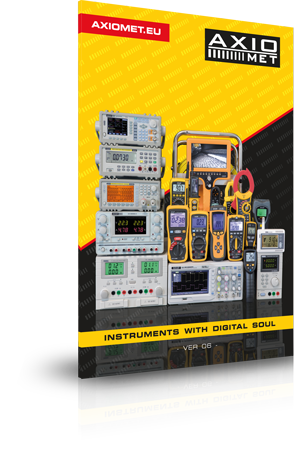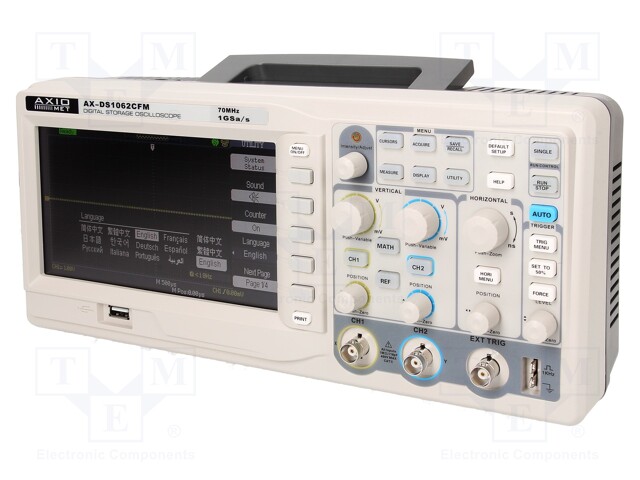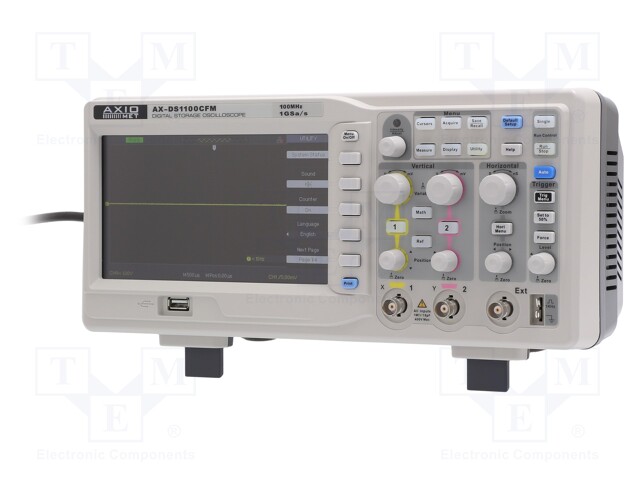Standard or handheld oscilloscope – which one to choose?
In case of oscilloscopes, signal delivered to input of one or two channels is sampled, and then it is presented in graphical form on the screen, most often in time domain. Users can scale the signal horizontally and vertically and conduct different kinds of measurements.
Choice of an oscilloscope
While choosing an oscilloscope, attention should be paid to its basic parameters which correspond to device class. The type of oscilloscope should be suited to intended use; it is important to determine expected bandwidth, and to consider whether it would be used for measuring mainly analogue or digital signals. It is also worth considering whether the device is supposed to be used for detecting random phenomena or for tuning produced circuits.
Oscilloscopes and multimeters
A good oscilloscope can be used instead of a multimeter and it allows to reduce costs of equipment used in workshops. Modern oscilloscopes conduct measurements typical for multimeters automatically. Handheld oscilloscopes are particularly interesting solution in this regard because they are portable and convenient.
Basic parameters
- bandwidth
It defines maximum signal frequencies processed by an oscilloscope. In order for the signal to be reproduced correctly on the screen, the bandwidth should be 3 times bigger (in case of analogue signals) or even 5 times bigger (in case of digital signals) than frequency of the signal under test.
It is worth to consider buying AXIOMET AX-DS1100CFM oscilloscope, bandwidth of which amounts to 100 MHz.
- sampling rate
Due to the Nyquist criterion, bandwidth should be at least 2 times bigger than sampling rate of the signal being sampled. It let us avoid aliasing. In modern digital oscilloscopes, this parameter is often provided in two ways:
- for sampling in real time
- and for the so-called equivalent time.
The latter one pertains to repeatable signals which can be sampled in several passes, enhancing effective sampling rate at the same time.
- memory
The more memory, the more samples can be saved. Having a signal that is sampled accurately, it is possible to show it on the screen, however, the length of the waveform will be limited by the memory of the oscilloscope. In oscilloscopes manufactured by AXIOMET, this value amounts up to 1 GS/s.
Read also:
Other features
Standard and handheld oscilloscopes are characterised by minimum rise time and refresh rate.
-
rise time determines how quickly rising signals and impulses can be measured. Usually, rise time depends heavily on the bandwidth of an oscilloscope.
- refresh rate informs how much time the device needs in order to process the data and show them on the screen. The longer the time, the lower the frequency at which the oscilloscope is capable of capturing the waveforms. Short processing time allows to avoid dead periods during which waveforms are not registered. Refresh rate is important when users try to detect random phenomena, especially during diagnostics of electronic devices.
Read also:
Trigger features
Modern oscilloscopes are also equipped with advanced software. They allow us to choose triggering rules – both single trigger and automatic trigger.
Triggering criteria include:
- level of the signal,
- the second channel of an oscilloscope,
- additional channel,
- external trigger signal.
The most complex triggering features may be based on e.g. pulse width or on a mask, crossing of which results in suspension of triggering.
Additional capabilities
With the use of oscilloscopes, it is possible to test components easily and in semi-automatic way, e.g. by specifying conditions to be met by the signal in order for the device to be deemed as working properly. Good oscilloscopes are also capable of calculating Fourier transform with the use of chosen measurement windows.
The number of channels supported by a given oscilloscope, as well as interfaces used for connecting the device to other equipment should be taken in consideration while choosing an oscilloscope.
Oscilloscopes available in the market may also differ in terms of accessories included in the set: probes and test leads.
Summary
In consumer electronics, manufacturers of oscilloscopes strive to outdo their competitors by offering wide range of advanced devices. Of course, one of the most important things is good software which allows for analyzing data with ease, and in case of handheld devices – their weight and quality of enclosure are important features.















